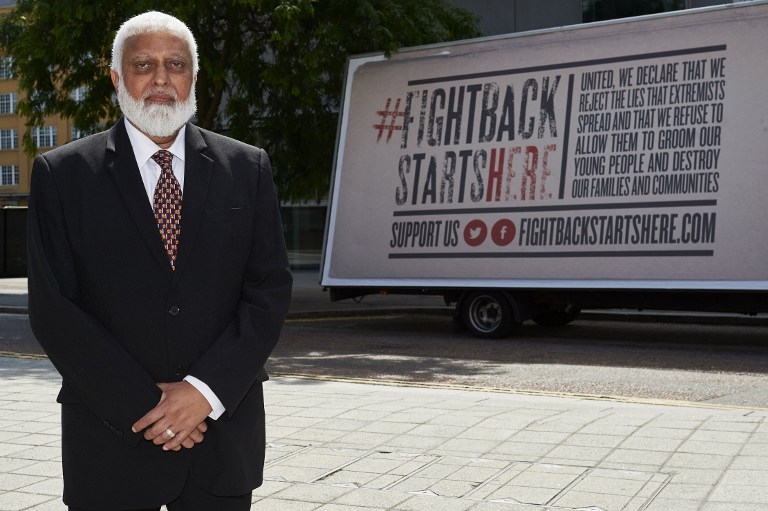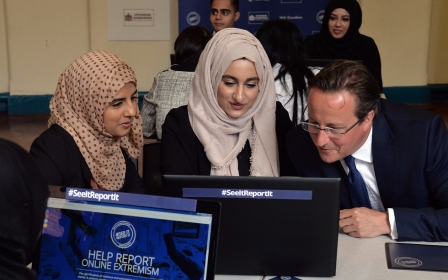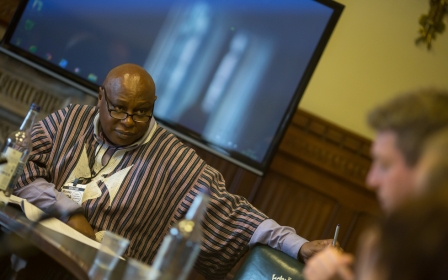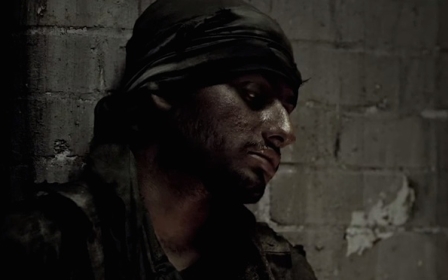UK government 'running covert counter-extremism propaganda campaign'

The British government is running a covert “propaganda” campaign intended to project its counter-extremism message to British Muslims through supposedly “grassroots” community organisations, a report published on Monday claims.
Several recent high-profile counter-extremism initiatives that appeared to be the work of non-government organisations were actually orchestrated by a media company, Breakthrough Media, with close links to the Home Office's Research, Information and Communications Unit (RICU), the report says.
They include Fightback Starts Here, a counter-extremism campaign launched last July which was widely described as “Muslim-led” and backed by a broad coalition of charities, campaign groups and community organisations.
Another Breakthough project was a website, Help for Syria, which was launched in 2013, ostensibly by three Muslim charities, to encourage people to donate money rather than joining aid convoys or travelling to perform humanitarian work in the war-stricken country.
In some cases, the charities and organisations which fronted the campaigns were not aware of Breakthrough Media's close links to the Home Office, while Breakthough employees were required to sign the Official Secrets Act in order to conceal that relationship, the report says.
According to CAGE, the civil liberties group focused on issues affecting Muslim communities which produced the report, the campaign amounts to an attempt to manufacture “state-sponsored grassroots activism” and the “first concerted foray into cyberspace by the British state with the aim of covertly engineering the thoughts of its citizens”.
“RICU is using ‘grassroots’ organisations as mouthpieces for a Prevent-sanctioned agenda, which justifies a securitised approach to all aspects of Muslim life,” said Asim Qureshi, CAGE's research director and one of the authors of the report.
“There is also evidence to suggest that the government is using the Official Secrets Act to hide its relationship with the role of Breakthrough Media, the PR company driving the propaganda. This suggests an abuse of power and a contempt for open society.”
RICU is based in the Home Office's Office for Security and Counter-Terrorism (OSCT) and has been involved since it was established in 2007 in communicating the government's Prevent counter-extremism strategy.
Much of its work remains secretive, but Home Secretary Theresa May told parliament's joint security committee in 2011 that RICU was “currently road-testing some quite innovative approaches to counter-ideological messages”.
'Sharper and more professional'
An updated edition of the government's counter-terrorism strategy published in the same year also said that RICU would be required to “deliver sharper and more professional counter-narrative products”.
Breakthrough Media is a “creative communications agency” with offices in London and Nairobi whose past projects include a documentary for Al Jazeera about the mayor of Mogadishu, and a film called Faith on the Frontline produced for the UK's Armed Forces Muslim Association.
But other projects about which the report raises concerns do not feature in its online portfolio.
The Fightback Starts Here campaign was fronted by the Leicester-based Federation of Muslim Organisations (FMO) and consisted of a video, a website and a letter published in the Guardian newspaper signed by representatives of “charities, civil society organisations and safeguarding groups” who pledged to work together to defeat the “poisonous ideology” of extremism.
The letter was also signed by relatives of David Haines and Alan Henning, two British hostages killed by the Islamic State (IS) group in Syria.
A report of the launch in the Guardian quoted Suleman Nagdi, a spokesperson for the FMO, as saying that while other anti-extremism efforts such as the Prevent strategy were top-down, Fightback Starts Here was grassroots-based.
“Engagement with the community is just as crucial as any government policy. You can legislate as much as you want, but there must be a buy-in from the community. Hopefully, this will be that buy-in,” Nagdi said.
But Luman Ali, another spokesperson for the FMO, told Middle East Eye that the organisation had been approached by Breakthrough about the project, and that the media company had funded and organised it.
Breakthrough also produced an online radio station, Ummah Sonic, broadcast via the FMO's website.
“The FMO is committed to fighting extremism in all its forms. We are happy to take part in any initiatives that focus on such a theme regardless of what level that is at,” Ali said.
“In terms of the Fightback campaign we lent our support because it spoke against all forms of extremism. Had it been against only one form of extremism we would not have supported such a campaign. We have not received a single penny from any of these campaigns in terms of funding.”
Breakthrough Media also approached three charities, Hand in Hand for Syria, Syria Relief and Human Care Syria, about the Help for Syria website.
A former employee of one of the charities quoted in the report said the company had said it could advertise their work, help them with media and even provide funds for events.
Stopped returning emails
But the charities subsequently fell out with Breakthrough over the message of the campaign and stopped returning emails. The company also refused to tell them who was funding the project, the former employee said.
Another project produced by Breakthrough was "Open Your Eyes," a web-based video project “exposing the reality of ISIS [IS],” launched by Upstanding Neighbourhoods, a Birmingham-based community group.
in August last year, Upstanding Neighbourhoods was singled out for praise by May during a visit to Birmingham.
"It is about groups, as we have seen today - people in their communities, volunteers coming forward, working together in partnership because the government can't do this on its own," May said, according to the Birmingham Post newspaper.
The company was also a consultant on another IS-themed film, Not Another Brother, produced for the Quilliam counter-extremism think tank which has received Home Office funding in the past.
The CAGE report cites a now-deleted blog post written by a Breakthrough employee suggesting that new employees are required to sign the Official Secrets Act.
“The company website gives a good account of their work although much of the detail is generalised simply because what they do and who it is for, in the main, is governed in the UK by the Official Secrets Act – which each employee must sign on joining – and divisive in nature, as it involves raising awareness and, in many cases, opposing vested political / religious interests for the greater good – both in the UK and abroad,” an archived version of the blog post says.
Social media workshops
Evidence of a relationship between Breakthrough Media and RICU is also suggested by a statement by Eric Pickles, the former communities and local government minister, who told Parliament in 2014 that his department had organised social media workshops “in conjunction with Home Office Research Information and Communication Unit and Breakthrough Media”.
“Based on the material we have gathered, there seems to be a strong possibility that Breakthrough Media have not only been tasked with working with or for the Home Office to further counter narratives, but that [they're] protected under the Official Secrets Act in order to hide such relationships,” the report says.
“It might be suggested, that the government is attempting to engineer a debate around Muslim life in the UK, by promoting certain organisations and views, allowing them to present themselves as independent and based within the grassroots of their communities.”
Qureshi said the findings of the report should be a cause of concern to the British public and confirmed "the hidden hand of those who wish to manufacture consent for the expansion of the security state. We are calling for greater scrutiny of RICU work, to include an independent audit to assess the ethics and cost of the whole programme.”
Breakthrough Media had not responded to requests for comment at the time of publication.
A Home Office spokesperson told MEE that working in partnership with communities and civil society groups to confront extremism was a key part of the government's Prevent strategy.
“The battle against terrorism and extremism must be fought on several fronts including countering its twisted narrative online and in our communities. The need for this work is recognised at a national and international level.
"We are very proud of the support RICU has provided to organisations working on the frontline to challenge the warped ideology of groups such as Daesh [IS], and to protect communities.
"This work can involve sensitive issues, vulnerable communities and hard to reach audiences and it has been important to build relationships out of the media glare. We respect the bravery of individuals and organisations who choose to speak out against violence and extremism and it is right that we support, empower and protect them.
"Our guiding principle has to be whether or not any organisation we work with is itself happy to talk publicly about what they do. At the same time we are as open as possible about RICU’s operating model, and have referenced the role of RICU in a number of publications and in Parliament.”
Ben Hayes, a counter-terrorism consultant and the co-author of the report, told MEE its findings highlighted the need for an "honest conversation about the impact, legitimacy and effectiveness of the government's own secret propaganda programmes".
"We should be under no illusion as to what is going on here. When the government starts using community groups and NGOs to disseminate government propaganda to hoodwink the public into believing they are authentic, 'grassroots' campaigns, it damages everyone in civil society."
New MEE newsletter: Jerusalem Dispatch
Sign up to get the latest insights and analysis on Israel-Palestine, alongside Turkey Unpacked and other MEE newsletters
Middle East Eye delivers independent and unrivalled coverage and analysis of the Middle East, North Africa and beyond. To learn more about republishing this content and the associated fees, please fill out this form. More about MEE can be found here.




